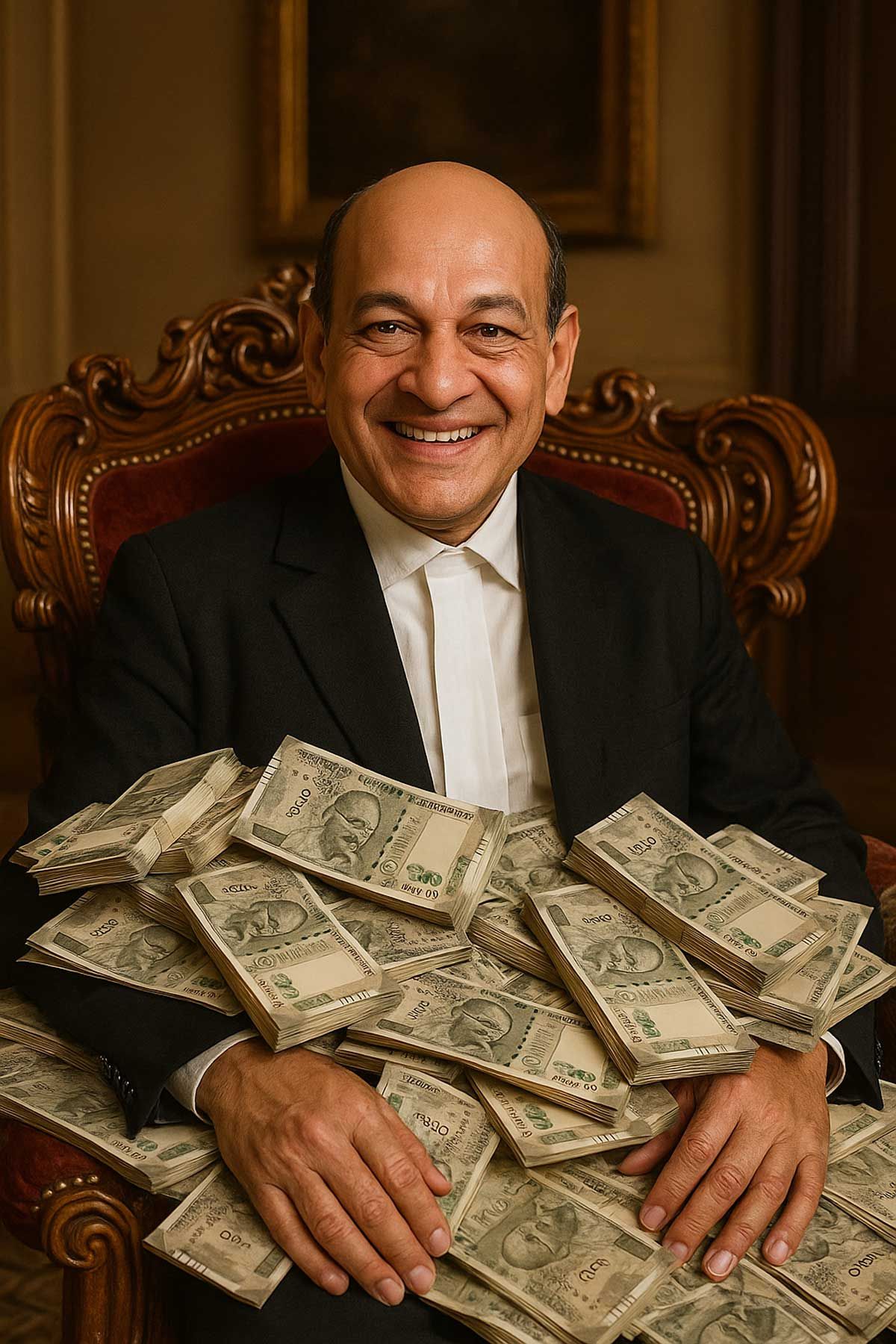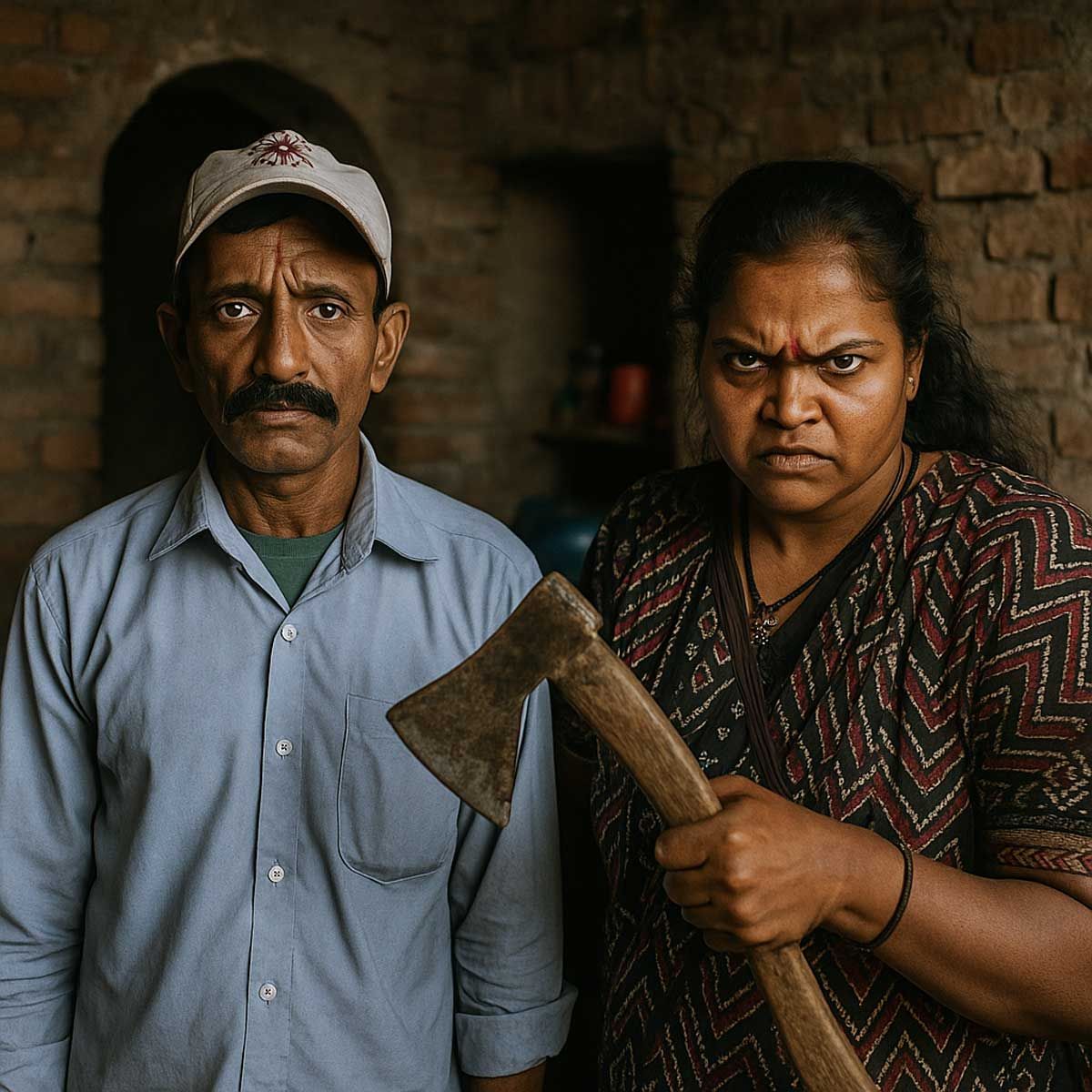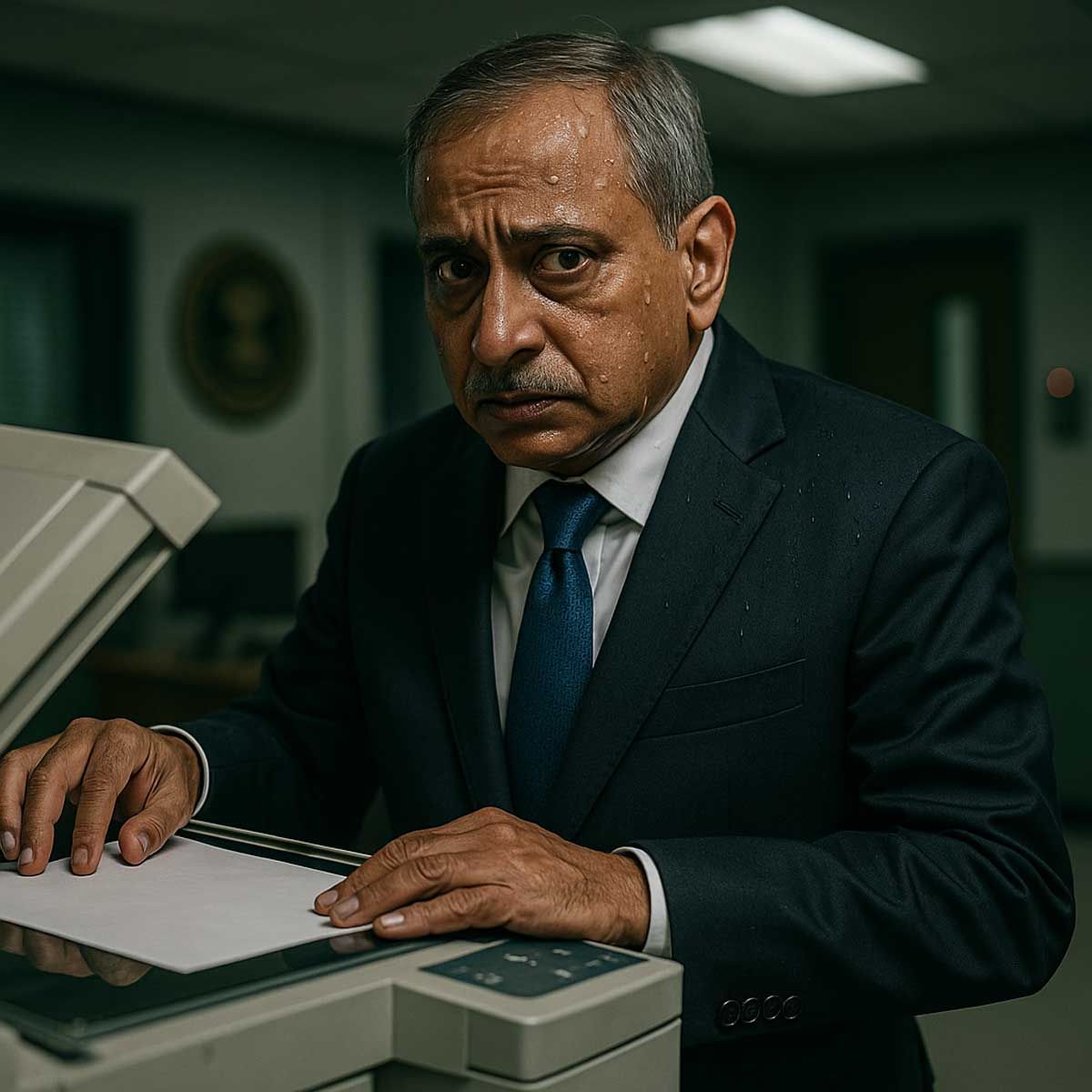More Coverage
Twitter Coverage
Satyaagrah
Written on
Satyaagrah
Written on
Satyaagrah
Written on
Satyaagrah
Written on
Satyaagrah
Written on
JOIN SATYAAGRAH SOCIAL MEDIA
A fire, burnt cash, and a judge under suspicion—yet the Supreme Court refuses an FIR against Justice Yashwant Varma, asking petitioners to first write to the President and PM, shielding its own while justice quietly exits the courtroom, unheard and unseen

On a warm Wednesday morning, May 21, the highest temple of justice in the land— the Supreme Court of India— chose to perform a familiar ritual. A petition seeking a First Information Report (FIR) against Justice Yashwant Varma was swiftly swept aside, not because the allegations weren’t serious, but because, as it turns out, the petitioners hadn’t first written formal love letters to the President and the Prime Minister.
|
|
The petition, filed by Advocate Mathews J. Nedumpara and three others, was linked to disturbing claims: that bundles of illicit cash had been recovered from the official residence of Justice Varma following an in-house inquiry. Yet, the guardians of justice found more fault in the petitioner’s paperwork than in the possible misconduct of one of their own.
Presiding over the matter, Justice Abhay S. Oka and Justice Ujjal Bhuyan didn’t blink at the nature of the allegations. Their attention lay firmly on the fact that the matter had already reached the desks of two of the most powerful people in the country. The Chief Justice of India, they explained, had taken the magnanimous step of forwarding the report of the in-house inquiry, along with Justice Varma’s response, to the President and Prime Minister.
The court’s reasoning? “Since the petitioners have not filed a representation before the President and the Prime Minister seeking action, the writ petition seeking mandamus is not maintainable.” One might think that in a country where the judiciary claims to be the last refuge of justice, a matter this serious would be acted upon, not stalled behind a bureaucratic etiquette lesson.
Other pleas in the petition—like challenging the Veeraswami judgment, which sanctifies in-house inquiries as the holy grail for handling judicial misconduct—were simply brushed aside. The bench concluded these “need not be considered at the present stage.”
Not now, not yet. Perhaps never.
As the matter opened, Justice Oka, addressing the petitioner Nedumpara, who stood alone and persistent, remarked with the certainty of an oracle:
“There was an in-house inquiry report. It has been forwarded to the President of India and the Prime Minister of India. So follow the basic rule. If you are seeking a writ of mandamus, you have to first make a representation to those authorities before which the issue is pending. Action has to be taken by the President and the Prime Minister.”
What followed was an admission as bizarre as it was revealing:
“We are not saying you cannot file. You don't know the contents of the report. We also don't know the contents of that report. You make a representation calling upon them to take action. If they don't take action, then you can come here.”
In this circus of due process, everyone is blindfolded—except the accused.
Still pressing forward, Nedumpara questioned the judicial crutch known as the Veeraswami judgment, under whose shelter judges cannot be criminally investigated without the express permission of the Chief Justice of India. A judge, then, must bless the prosecution of a fellow judge—an arrangement that smells more like fraternity than fairness.
Justice Oka calmly summarized the entire thrust of the petitioner’s plea:
“Ultimately, your main prayer is action should be taken against the concerned judge.” And then, as if closing a rulebook rather than weighing justice, he said:
“Please follow the basic rule while seeking the writ of mandamus.”
Nedumpara clarified further that this was not only a plea for mandamus. It was also a declaration that the discovery of cash from the judge’s chambers constituted a cognizable offence under the Bharatiya Nyaya Sanhita and the Prevention of Corruption Act, and that the police were, by law, duty-bound to register an FIR.
The bench’s response? Silence. “The bench did not entertain the matter further.”
|
According to the petitioners, the Chief Justice had forwarded the in-house inquiry report to the President and Prime Minister only after reportedly finding the allegations to be prima facie true. This is not rumor or gossip—it is the Judiciary’s own documentation. Yet, even then, the Supreme Court refused to allow a criminal investigation, effectively treating the judiciary like a sacred cow that must never be touched, no matter how strong the stench.
This is not the first time Nedumpara has tried. In March, he filed a petition against the then-ongoing in-house inquiry itself, asking instead for an open criminal probe. But at that time, the Supreme Court had deemed it “premature.” Their words then were clear: “At this stage, it will not be appropriate to entertain this Writ Petition.”
Now, when the inquiry is over, it’s not “premature”—just “procedurally invalid.”
How long must a fire burn before someone admits there’s smoke?
In this new petition, the petitioners mounted a strong argument: that the Veeraswami ruling, which demands prior approval of the CJI to even lodge an FIR against a sitting judge, is contrary to democratic norms and must be reconsidered. The courts have used this judgment like a cloak—a cover under which allegations simmer but never boil.
They also rightly argued that impeachment is not enough. Removing a judge from office might be a civil remedy, but when that same judge is found with questionable cash at his residence, penal consequences must follow. As the petition poignantly stated: when the accused is a judge, the gravity of the offence is far greater.
The petitioners also called for a full investigation—to identify who paid the alleged bribes, who benefitted, and which cases were compromised. But the doors remained shut, bolted by rules designed not for transparency, but for protection.
|
Let’s not forget the spark that ignited this controversy. On March 14, a fire broke out at Justice Varma’s official residence in Delhi. As flames engulfed a storeroom, large amounts of cash were discovered—some of it burnt, most of it unexplained. A few days later, on March 21, the Chief Justice of India formed a three-member committee to look into it, based on a report by Delhi High Court Chief Justice DK Upadhyay.
The committee’s report, along with Justice Varma’s response and related visuals, was published on the Supreme Court’s website—a move some hailed as transparency, though others saw it as a controlled release, carefully curated.
Then came the subtle choreography. On March 24, Justice Varma’s judicial work was quietly withdrawn by the Delhi High Court. The Supreme Court Collegium recommended his transfer to the Allahabad High Court, his original posting. A judge suspected of corruption was not suspended or investigated—he was transferred. A change of location, not a call for accountability.
Justice Varma has, of course, denied all wrongdoing. He insists it is all a conspiracy against him.
But the pattern is hard to ignore: An internal report hints at something serious. Fire, cash, inquiry. Then, silence, transfer, and excuses. While the public is asked to trust the system, the system spares no effort in protecting itself.
It seems in India, when it comes to judges judging other judges, even a pile of cash cannot speak loud enough. Only silence echoes in the courtroom.
Case No.: W.P.(C) No. 534/2025
Case Title: Mathews J Nedumpara and Ors. v. Supreme Court of India and Ors.
 Support Us
Support Us
Satyagraha was born from the heart of our land, with an undying aim to unveil the true essence of Bharat. It seeks to illuminate the hidden tales of our valiant freedom fighters and the rich chronicles that haven't yet sung their complete melody in the mainstream.
While platforms like NDTV and 'The Wire' effortlessly garner funds under the banner of safeguarding democracy, we at Satyagraha walk a different path. Our strength and resonance come from you. In this journey to weave a stronger Bharat, every little contribution amplifies our voice. Let's come together, contribute as you can, and champion the true spirit of our nation.
 |  |  |
| ICICI Bank of Satyaagrah | Razorpay Bank of Satyaagrah | PayPal Bank of Satyaagrah - For International Payments |
If all above doesn't work, then try the LINK below:
Please share the article on other platforms
DISCLAIMER: The author is solely responsible for the views expressed in this article. The author carries the responsibility for citing and/or licensing of images utilized within the text. The website also frequently uses non-commercial images for representational purposes only in line with the article. We are not responsible for the authenticity of such images. If some images have a copyright issue, we request the person/entity to contact us at This email address is being protected from spambots. You need JavaScript enabled to view it. and we will take the necessary actions to resolve the issue.
Related Articles
- "Action speaks louder than words": Amidst rising tension in Manipur, the Supreme Court steps in, forming an all-women judicial committee to ensure justice. While incidents in other states might be overlooked, Manipur won't be left in the shadows
- Bombay HC grants bail to a 24-year-old rape accused, citing 14-year-old girl's sufficient knowledge of her actions, despite her father filing an FIR after finding her missing for 4 days in Juhu Chowpatti; apparently, minors now sign invisible consent form
- "अरे क्या वकील साब, इतना तो चलता है": In a recent judgment, Madras High Court redefines terrorism; granting bail to UAPA accused Asif Mustahin who expresses desire to join IS, ‘Planning to kill Hindu leaders from BJP, RSS cannot be called a terrorist act’
- ‘Come on, one must not be so narrow-minded’: Supreme Court dismisses plea demanding a total ban on Pakistani artists in India, says... to be a patriot, one must not be hostile to foreigners, also lauds GoI for Cricket World Cup with Pakistan participation
- "There is difference between blasphemy and expressing religious opinions based on one’s knowledge of the subject": Historic decision by Madras High Court from 2019
- "As per Article 195 from the book ‘Principles of Mohammedan Law’ by Sir Dinshah Fardunji Mulla, Muslim girl above 16 is competent to marry any person of choice": Punjab and Haryana HC cites Sharia to justify child marriage
- Chennakeshava temple in Belur kicks off 'Rathotsava festival' with Quran recitation: Earlier temple administration requested Muslims to vacate their shops, however, Govt gives their nod for non-Hindus to set up stalls throughout festival
- "A people that values its privileges above its principles soon loses both": Delhi High Court upheld the freedom of speech privilege of the advocacy profession, Justice Mini Pushkarna even refused to look into irrelevance or maliciousness of the statement
- "Honor or Endure": Azad Ansari's 3-year sentence for insulting Sri Ganesh during Ganeshotsav on Facebook, a stark warning in Gujarat; respect Hindu beliefs while in Bharat or face legal consequences, a significant verdict upholding Hindu religious dignity
- ‘Realisation is same as jail’: Delhi High Court invoked Fyodor Dostoyevsky’s book 'Crime and Punishment' to reduce life sentences to 10 years for five Jaish-e-Mohammed terrorists—Bilal, Sajjad Khan, Muzaffar Bhat, Mehraj-ud-Din, and Ishfaq Bhatt
- "The weight of 59 lives demands attention": Supreme Court denies bail to three Godhra train case convicts, emphasizing its severity. The 2002 incident claimed 59 lives, including women and children, leading to widespread riots in Gujarat
- "We must distinguish between speaking to deceive and being silent to be reserved": After Delhi and Allahabad, Madhya Pradesh High Court also admitted PIL challenging the constitutional validity of the Waqf Act, enacted by Congress Govt in 1995
- "Emails For Justice": The SC fast-tracks Moitra's plea after CJI's email invite; when emailing judges is the secret weapon, Moitra's urgent plea against Lok Sabha expulsion becomes a test case for judicial responsiveness in high-profile scenarios
- "Get your facts first, then you can distort them as you please": SC grants bail to life convict Farooq who pelted stone at burning Godhra Train in 2002 & prevented Hindus inside train from escaping from fire, CJI Chandrachud ~ "It has been 17 long years"
- Calcutta Quran Petition: A petition to ban the Quran altogether was filed 36 years ago, even before Waseem Rizvi petitioned for removing 26 verses from Quran




























